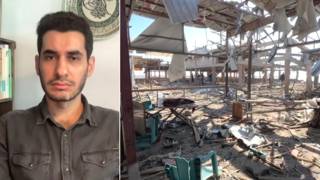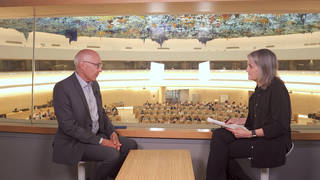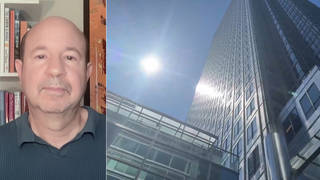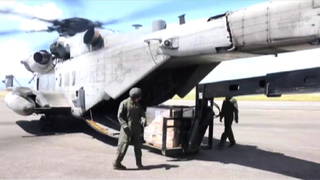
Topics
Guests
- Luis GutiérrezDemocratic congressmember from Illinois. He is the chair of the Immigration Task Force of the Congressional Hispanic Caucus.
Last week, Oklahoma Senator Jim Inhofe proposed reopening a U.S. military base in Puerto Rico as Congress considers legislation to address Puerto Rico’s debt crisis. For decades, Puerto Rico was host to a slew of U.S. military bases, where the Navy conducted bombing practices and war games, dumped old munitions, leading to lasting environmental damage, and napalmed the island. We speak with Rep. Luis Gutiérrez (D-IL), who has been arrested protesting the U.S. military bases.
Transcript
AMY GOODMAN: Congressmember Gutiérrez, I want to ask you about Puerto Rico before we go. Last week, Republican Oklahoma Senator Jim Inhofe recommended reopening the U.S. military base on Vieques in Puerto Rico, as Congress considers legislation to address Puerto Rico’s debt crisis. For decades, the Navy used nearly three-quarters of Vieques for bombing practice, war games, dumping old munitions, leading to lasting environmental damage, napalming the island. The Navy ended training operations in 2003, following massive civil disobedience. Senator Inhofe said reopening the base at Vieques would benefit the U.S. military and the Puerto Rican economy. I want to play for you what he said.
REP. LUIS GUTIÉRREZ: Sure.
SEN. JIM INHOFE: I would think that any kind of a deal that is made is going to have to include consideration for the training that is still available. I mean, there’s still no range like Vieques anywhere in the Western Hemisphere. What can be done in Vieques cannot be done on one location by a joint force.
AMY GOODMAN: Congressman Gutiérrez, your response?
REP. LUIS GUTIÉRREZ: Well, first of all, Amy, the last time the federal magistrate sentenced me to a year of probation, they were very clear that if I participated once again in protesting in Vieques and trespassing on federal lands there, that I would be sent to jail. Should they ever open that, I will protest, along with thousands of others, to stop the bombing of Vieques. We’ve won that fight and that battle. If they want, they can bomb the coast of Florida. They can bomb the coast of Georgia. They can bomb a lot of different coasts. But what does the senator say? “Oh, no”—from Oklahoma—”Let’s not bomb Oklahoma. Let’s just bomb those poor Puerto Ricans, because that’s a perfect place that we can do it.”
And we can do it because, as been established by these hearings, Amy, something that—if my dad in 1950 in Puerto Rico would have said that Puerto Rico was a colony of the United States, he would have been jailed under the Smith Act as it was interpreted in Puerto Rico, La Ley de la Mordaza in Puerto Rico, their version of the Smith Act. And yet, today, clearly, the Congress of the United States has established that Puerto Rico is ruled under the territorial clause of the Constitution of the United States. You know what that means, Amy? That means that Puerto Rico is owned by, is a property of the United States, but not a part of the United States, and that the Congress has plenary powers over the people of Puerto Rico. Here’s what I say: You know, Inhofe, it seems to me that King George III, if he were to look at the Congress of the United States and see you, Senator, he would say to himself, “God, I thought I was the despot. I thought I was the tyrannical person over the 13 colonies. You guys are exceeding anything that I did, as King George III, with my 13 colonies.” No, we fought a war against colonialism. We need to fight that same war against the colony of Puerto Rico and free it, free it, so that it can become everything that it can be.













Media Options